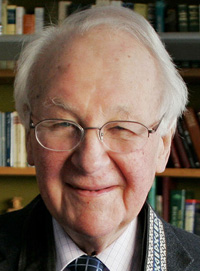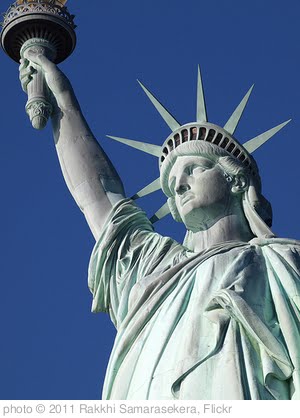Scripture
On Monday the Dow Jones industrial average fell 634.76 points; the sixth-worst point decline for the Dow in the last 112 years and the worst drop since December 2008. Every stock in the Standard and Poor's 500 index declined.
It is easy to blame bipartisan bickering for the impasse that led to Standard and Poor's downgrading of the American debt, and in turn the vertiginous fall of the Dow. This bickering -- this substitution of ideology for reason, of egotism for compassion and responsibility on the part of lawmakers -- is a national disgrace; but while it failed to fix the problem, we must realize that it did not cause it. The cause -- and potential for a significant renewal -- lies much deeper.
So let's allow ourselves to ask a fundamental question: what's an economy for?
The debate we have just witnessed has shown Washington, D.C. not just to be broken, but corrupt. The American people are disgusted watching politicians play political chicken with the nation's economy and future. In such a bitter and unprincipled atmosphere, whoever has the political clout to enforce their self-interest and retain their privileges wins the battles. But there are two casualties in such political warfare: the common good and the most vulnerable.
So how will vulnerable people fair under this deal? "The Circle of Protection," a diverse nonpartisan movement of Christian leaders, has been deeply engaged in the budget debate to uphold the principle that low-income people should be protected. But it is hard to evaluate a deal that averts a crisis when the crisis wasn't necessary in the first place. Over the past few weeks, our economy has indeed been held hostage as politicians negotiated the price of the release. Ultimately, I think most of us wish that no hostages had been taken in the first place, and this was no way to run a government or make important budget decisions.
 [Editors' note: Rev. John Stott, one of the world's most influential evangelical figures over the past half-century, died this Wednesday at age 90. Rev. Stott served as a contributing editor for Sojourners magazine, when we were known as The Post American, and wrote this article for the November/December, 1973 issue of the magazine. We will always remember Rev. Stott for his profound contributions to our community and the Church.]
[Editors' note: Rev. John Stott, one of the world's most influential evangelical figures over the past half-century, died this Wednesday at age 90. Rev. Stott served as a contributing editor for Sojourners magazine, when we were known as The Post American, and wrote this article for the November/December, 1973 issue of the magazine. We will always remember Rev. Stott for his profound contributions to our community and the Church.]
It seems to be a characteristic of the Anglo-Saxon mind to enjoy inhabiting the "polar regions" of truth. If we could straddle both poles simultaneously, we would exhibit a healthy balance. Instead, we tend to "polarize". We push some of our brothers to one pole, while keeping the other as our own preserve.
What I am thinking of now is not so much questions of theology as questions of temperament, and in particular the tension between the "conservative" and the "radical."
"God is Watching," reads the headline for a full page ad Sojourners ran in this morning's Politico. It is the latest in a series of radio, print, and online ads we have put out on the budget debate and default crisis. On Tuesday, we launched radio ads in Kentucky, Nevada, and Ohio that were recorded by local pastors who lifted up the moral issues at stake in the debate.
Furthermore, our work in the past few weeks and the Circle of Protection meeting with the president has been covered by the Washington Post (and here), CNN (and here), MSNBC, Politico, Roll Call, and many local outlets from across the country. Behind all the ads and the press is the muscle -- and that muscle is you.
Today is another intense day of politics at the White House. The debt default deadline is fast approaching. The stakes for the nation are high as politicians can't agree on how to resolve the ideological impasse on how to reduce the deficit before the nation defaults on its financial obligations.
Yesterday, before Congressional leaders were due at the White House for critical negotiations, I, along with 11 other national faith leaders, met with President Obama and senior White House staff for 40 minutes. We were representing the Circle of Protection, which formed in a commitment to defend the poor in the budget debates. Sitting in the Roosevelt Room of the White House, we opened in prayer, grasping hands across the table, and read scripture together. We reminded ourselves that people of faith must evaluate big decisions on issues like a budget by how they impact the most vulnerable.
"I will call them my people, who were not my people. And her beloved, who was not beloved." (Romans 9:25 referencing Hosea 2:23)
Estranged, alienated, and removed; anyone living in an industrialized modern society in the 21st century would be able to define, or at least identify the sentiments of these words. Our time is one of mass communication and instantaneous access to knowledge. And yet our lives are too compartmentalized, increasingly divided, and our society reflects this. Indeed the existential writers of yesteryear were correct in diagnosing the iron cage that would befall us, ultimately leading to an eclipse of reason.
Our current practice in the U.S. actually reflects the earlier legal reality of coverture: In the process of the "two becoming one flesh," the wife lost her rights to property, legal representation in court, and even her public identity as her husband became the sole representative for the family. This combination of identities (or, rather, the wife becoming lost in her husband's identity) led to wives taking their husbands' last names. For me, losing my surname would have represented silent assent to this oppressive practice.
This past weekend, Christians around the world celebrated one of our holiest holi-days: Pentecost. Pentecost, which means "50 days," is celebrated seven weeks after Easter (hence the 50), and marks the birthday of the Church, when the Holy Spirit is said to have fallen on the early Christian community like fire from the heavens. (For this reason, lots of Christians wear red and decorate in pyro-colors. This day is also where the fiery Pentecostal movement draws its name).
But what does Pentecost Sunday have to do with just another manic Monday?
What does a religious event a couple of thousand years old have to offer the contemporary, pluralistic, post-Christian world we live in? I'd say a whole lot. Here's why:
Let me start by confessing my bias. Not only am I a Christian, but I am a Christian who likes fire. I went to circus school and became a fire-swallowing, fire-breathing, torch-juggling-pyro-maniac as you'll see here. So naturally, I like Pentecost.
Do you find yourself reluctant to attend women's retreats, Bible studies, or conferences because too often they focus on fashion, dieting, women's emotions, and new forms of abdominal exercises?
